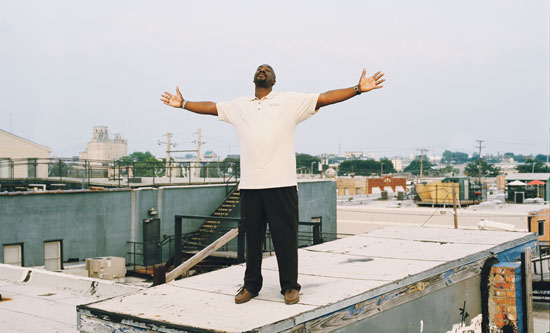James Woodard is quiet for a minute, as he lights a cigarette with a disposable lighter. He’s careful with his Kool, exhaling downward into the kitchen sink, tapping the ashes into the drain. Gravity blends with the silence and the smoke in the little kitchen, because of who this man is and what he’s done and what has been done to him.
Woodard moved in last night, and it couldn’t have taken long, since his furniture consists of exactly one item, a futon, now folded up like a clam. The rest of his worldly possessions fit into five small cardboard boxes. You’ve seen his apartment if you’ve ever seen any apartment: beige carpet, refrigerator, paint, and linoleum; one bedroom; an L-shaped balcony outside a sliding glass door. The angry dents in the front door–there’s a story there–are barely obscured by a fresh coat of brown paint. A plastic bottle of Palmolive dish soap on the kitchen counter is emerald and somehow beautiful against all the earth tones.
In the living area hang three glass shelves designed for tchotchkes, now holding bottles of water labeled with the apartment’s name, The Landing at Bear Creek. It’s in Euless. It’s close to the airport. It’s not bad; there are live oak and gum trees, the grass is cut, and the planes taking off from DFW to the east fly low but they’re not deafening. The 20 or so red brick buildings in the complex look like mansions, Woodard had said to someone asking for directions, and he was not being ironic.
For the first half of his life, James Woodard may as well have been invisible. For the second half, he positively disappeared. But in the last three weeks, he’s been interviewed on 60 Minutes and by local TV and newspapers. CNN’s cameras peeked over his shoulder as he applied for a driver’s license. The Texas Department of Motor Vehicles, bless its bureaucratic heart, would not hurry up the process despite the obvious importance of this man. Woodard didn’t mind. Texas government had already wasted over 27 years of his time. What was a few days more?
“Yeah, there was television in prison,” Woodard is saying. “But once you started watching, fiction and reality merged. I couldn’t imagine the world as it is. I saw a character on TV talking on a cell phone, but I didn’t realize everyone had a cell phone. TV prepares you from being shocked but not from being amazed.
“Imagine if you’d been asleep for 27 years. Everything has physically, literally, and figuratively changed.”
Especially Dallas. All Woodard’s memories of his hometown predate 1981. And then, three weeks ago, everything was suddenly different. “When I saw the city–amazing. I know the direction–but it’s not there. I wasn’t prepared for that. It’s all apartment complexes and high-rises. I’m a stranger in my own city.” Like other exonerees, Woodard is disoriented.
Exonerated. Dallas. DA. DNA. You’ve heard these words together. Of the 17 men from Dallas County whose convictions have been overturned in the past seven years, Woodard served the longest for a crime he had nothing to do with. He’s out because of five things: the hard work of the Innocence Project of Texas; the incontrovertibility of evidence based on deoxyribonucleic acid; the absolute fluke that this physical evidence was saved; the new district attorney, Craig Watkins; and Woodard’s own relentlessness. A web of malice and lies had put him in prison in the first place.
The daily insult of his existence for over two and a half decades changed him, made him a considerable man. Nothing he says or does for the rest of his life will be trivial.
This is the story of James Woodard.
Poets and songwriters offer a wide range of metaphors for the tick of the clock. Shakespeare compared time to a thief, a whirligig, and a noiseless foot, and to “waves toward a pebbled shore.” Something in that last one works best for a lot of people. If time is the river we’re all floating in, powerful hands held Woodard underwater from age 28 until three weeks ago. He’ll be 56 in October.
James Lee Woodard was born at “old Parkland” in 1952, the son of Lorena and a no-account, hit-and-run man named K.C. “One of those secret family deals,” Woodard says. “My father was never a force in my life. I saw him occasionally.” Lorena, struggling financially to raise James and his little sister Youlanda on the slim wages of a maid at the Sheraton, surrendered her 5-year-old son to her parents. Maggie and Leo Woodard and their grandson lived at 939 Church Street in Oak Cliff. This chunk of Church is a dead end, about 300 yards long. A neighbor has spray painted “NO TRASPASIN” on the fence out front. It might have looked all right back then, but now it’s tumbledown homes and mobile homes made permanent, all hard by Interstate 35. The lot is vacant now, in spitting distance of the roaring highway. It’s bordered by a vintage blue Band-Aid box of a trailer on one side and by Mora’s Progressive Insurance Agency on the other.
“I always loved school,” Woodard says. He attended N.W. Harlee Elementary and Franklin Delano Roosevelt Junior High. The teacher he remembers best is Mrs. Graham, who compelled her language arts students at Harlee to produce a 10-page paper, tough duty for fourth-graders. Little James tried to finesse the situation by writing in a very large hand, and with a great deal of space between words, but Mrs. Graham knew this game. She insisted that her students think and organize and produce something coherent. And thus began Woodard’s fondness for the written word and writing.
We’re eating lunch at Pappadeaux on Lemmon–Woodard and his saviors from the Innocence Project of Texas, Jeff Blackburn and Clay Graham. To complement his broiled shrimp and dirty rice, Woodard orders a glass of “dark wine,” a phrase our server, Ivan, does not comprehend. He tries again, index finger on the wine list, asking for a Clos du Bois Merlot, pronouncing the phrase phonetically. “Close do boys mare lot.” It works; Ivan brings the wine, and it is good.
Woodard looks fit but is far from jailhouse ripped. About average height, shaved head, sloped shoulders, dark dress slacks, and a new polo shirt. Arcing black eyebrows frame eyes that never look away. But his physical being is less powerful than the force of his personality; despite his mangled French, you can feel his intellect. Woodard is quoted verbatim herein. For example, he really did say that for him Dallas has changed “physically, literally, and figuratively.” Even with that flourish, his utterances are seldom undermined by theatricality or by lack of noun-verb agreement. Our conversations undoubtedly presage a future of hearing “What’s it like to be out? What was it like to be in?” But for now, he is patient and sincere, and he reminisces easily about everything except one thing: the humiliating details of his life in a cage.
“At age 14, I turned rebellious,” Woodard says. His sudden sass and independence made Grandpa feel too old to be a parent, so young James moved in with his mother and sister at their apartment in what Woodard calls “North Dallas,” although today’s North Dallas is at least 10 miles north of the corner of State and Hall streets.
“It was a new way of living, period,” he says. “The things I couldn’t do, I could do–staying out late, number one. I was starting to notice the other sex. This time was memorable. It was ’67, ’68, the first big years of integration. But integration was not a problem for me. I just like people. I don’t give a preference to a race.”






